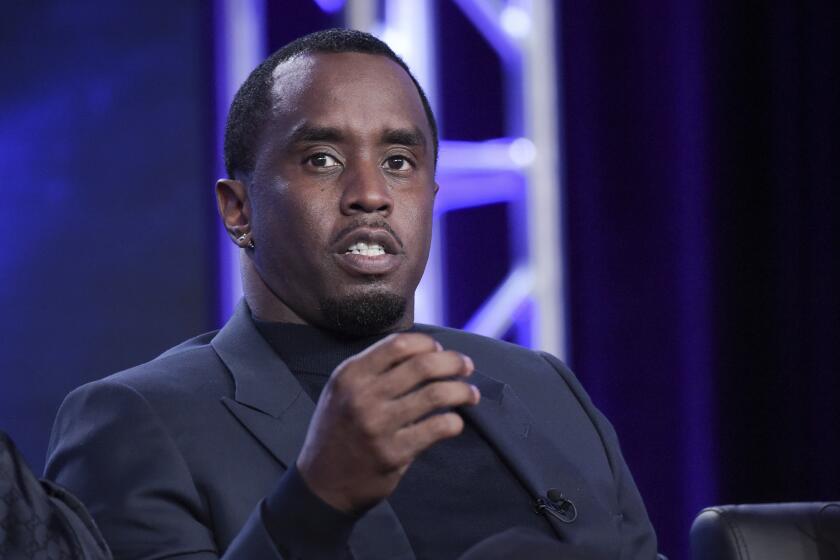Life after Lilith?
Stepping away from the spotlight can be a traumatic experience for pop performers, who risk losing their competitive edge and their fans.
But Sarah McLachlan, credited with liberating women in pop music in the ‘90s with her Lilith Fair tours, looks back on her four-year professional hiatus, when she and musician husband Ashwin Sood became parents of a daughter, India, as “a really blissful time.”
“For a good chunk of that time, I didn’t have to do anything but be a mom, and that was really luxurious,” adds the 35-year-old Canadian singer-songwriter. When she assesses what happened to women in pop music while she was gone, however, McLachlan isn’t as upbeat.
Lilith Fair “did further the careers of some women and disproved a lot of old attitudes in the concert business, things like you couldn’t put two women on the same bill, or you couldn’t let two women play back-to-back,” she says, speaking by phone from the backyard of her home in Vancouver, B.C.
Lilith indeed racked up some of the highest grosses of each year during its three-year lifespan with bills that included the Dixie Chicks, the Pretenders, Sheryl Crow, Luscious Jackson, Emmylou Harris, Sinead O’Connor, Hole, Bonnie Raitt, Erykah Badu, Liz Phair and Natalie Merchant. The tours also transformed McLachlan from a respected, moderately popular singer-songwriter into a cultural hero for a generation of female musicians.
But McLachlan believes that a door slammed shut the day Lilith ended.
“We suddenly got a huge crop of angry white male bands and the bubblegum pop music scene.... It saddens me in some ways to see these young women who think they have to be naked on the cover of every magazine.”
McLachlan doesn’t buy into the school of thought that it’s a new form of feminism, with women using their bodies as an instrument of empowerment.
“You’re still being exploited,” she says. “It’s troublesome.”
Anyone looking to see how motherhood has changed McLachlan’s perspective as a songwriter will have to be patient. Although her new album comes out Tuesday and its title, “Afterglow,” might seem to reflect the feelings of maternal bliss she speaks of, most of it was written and recorded before her daughter was born. Indeed, many of the songs reflect on relationship issues that date back nearly a decade, before she and Sood became a couple. That’s got to be good news for Sood, given the album’s many songs addressing romantic discord. At least one record company wag suggested calling it “Aftermath.”
“It’s funny,” McLachlan says. “Most of the stuff I’m dealing with is eight, nine, 10 years old and has nothing to do with my husband. What can I say, I’m slow to process.” Regarding life with Sood, and now India, she says, “Actually, I’ve been pretty happy.”
That wasn’t entirely true about a year ago, when she thought she was ready to return to the recording studio to wrap up work on “Afterglow,” which had been about 75% finished before she gave birth.
What happened after starting back to work too soon, she says, made her worry that “I’d lost it. I hated everything I was doing. It was all crap, and I figured, ‘That’s it. I’m done.’ I was beating my head against the wall and not enjoying it. Had my head been on straight, I would have simply walked out. But hormones and sleep deprivation will do that do you.
“I also lost a lot of tone in my voice while I was pregnant,” she says. “I got so despondent because I thought I’d lost my voice. It took a while for it to come back, and almost all the vocals I recorded during that time I had to re-sing after the fact.”
There remains a question of whether she can regain the momentum she’d developed after the release of her last studio album, 1997’s “Surfacing,” which became her biggest seller, logging 5.5 million copies in the U.S.
“I didn’t really think about how long it would take,” says McLachlan, whose mother died of cancer two years ago. “Between losing my mom and having a child, dealing with morning sickness for five months and a baby with colic for five more months, a lot of that time I could think about nothing but just getting through the day.”
“Afterglow,” however, is a solid return to form, her signature haunting ballads sung in a voice of ethereal purity and beauty. The biggest departure is “Stupid,” which has a chorus in which she ruminates on past mistakes while grinding, distortion-soaked electric guitars blaze behind her. It’s as if Linkin Park suddenly stumbled into her recording session.
“I’m really happy with that one,” she says. “I’ve been trying to get something like that on an album for a long time. All my stuff is usually all so soft and nice-sounding, which is great, but I also wish sometimes it had a bit more edge. Generally, I don’t write that kind of song. But I love Metallica.... When you’re in the right mood, a really hard-rock guitar sound -- there’s just nothing like it. It’s fun to play and it’s fun to sing.... This time it happened to fit with what I’m singing.”
She figures it will take her a few years to process all she’s experienced with childbirth, parenthood and the death of her mother. “I was thankful for being home while she was sick and being able to spend a lot of time with her.”
Losing a mother and becoming one almost simultaneously, she says, “informs everything. It’s been such a profound change in my life personally, it affects every element of my life.”
How might that eventually show up in her music?
“It’s hard to say yet. It’s too early.”
More to Read
The biggest entertainment stories
Get our big stories about Hollywood, film, television, music, arts, culture and more right in your inbox as soon as they publish.
You may occasionally receive promotional content from the Los Angeles Times.










